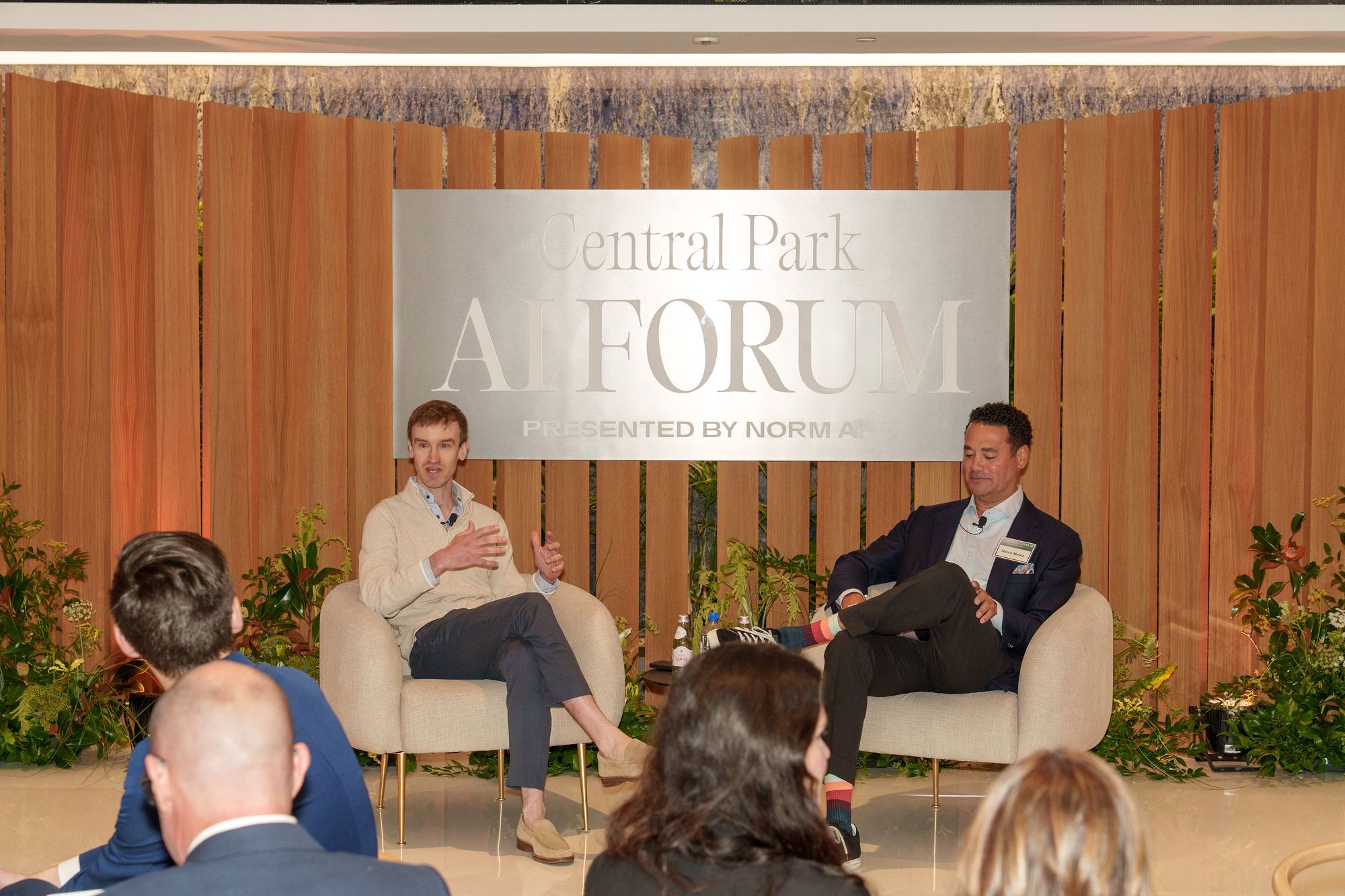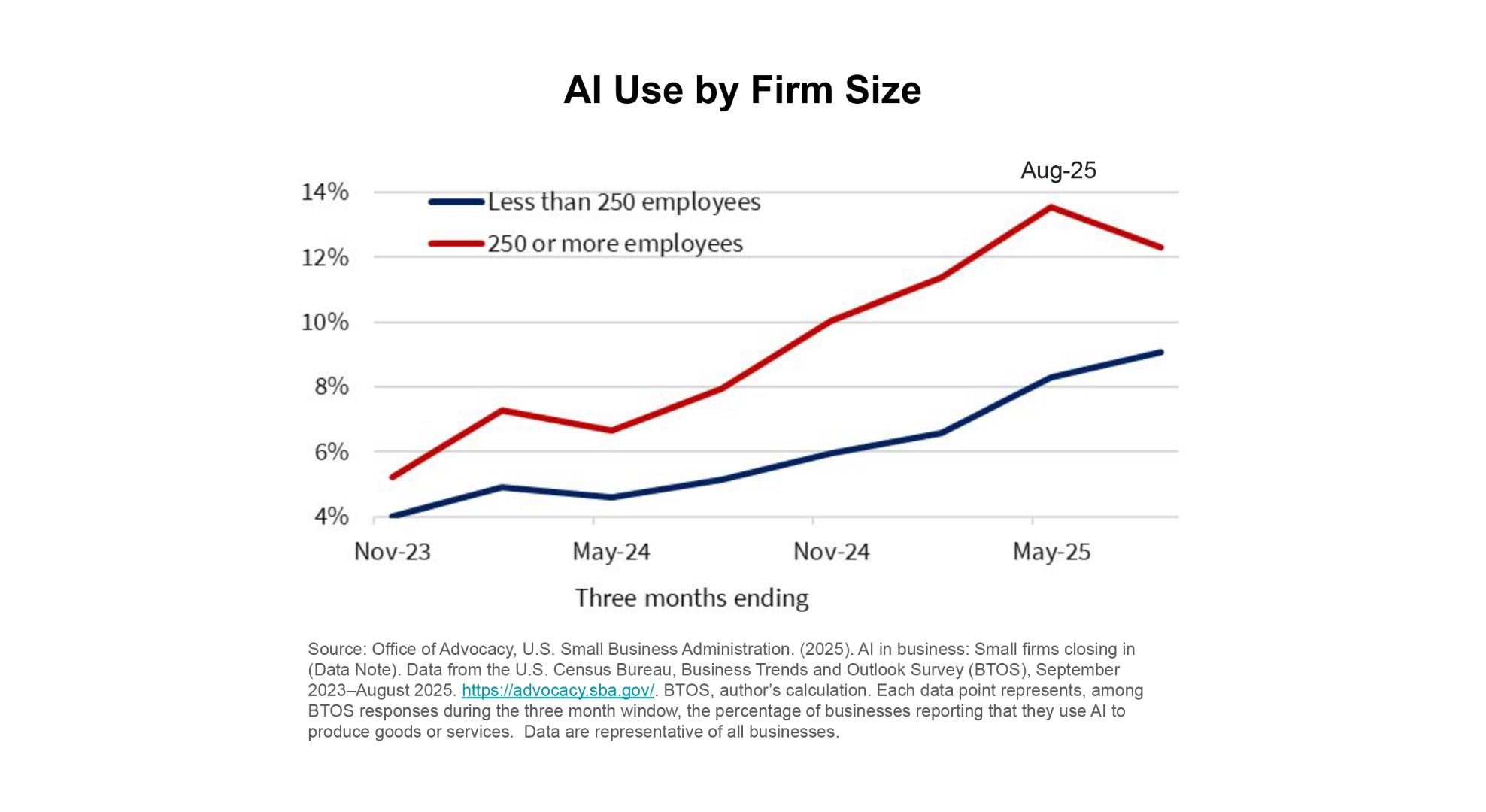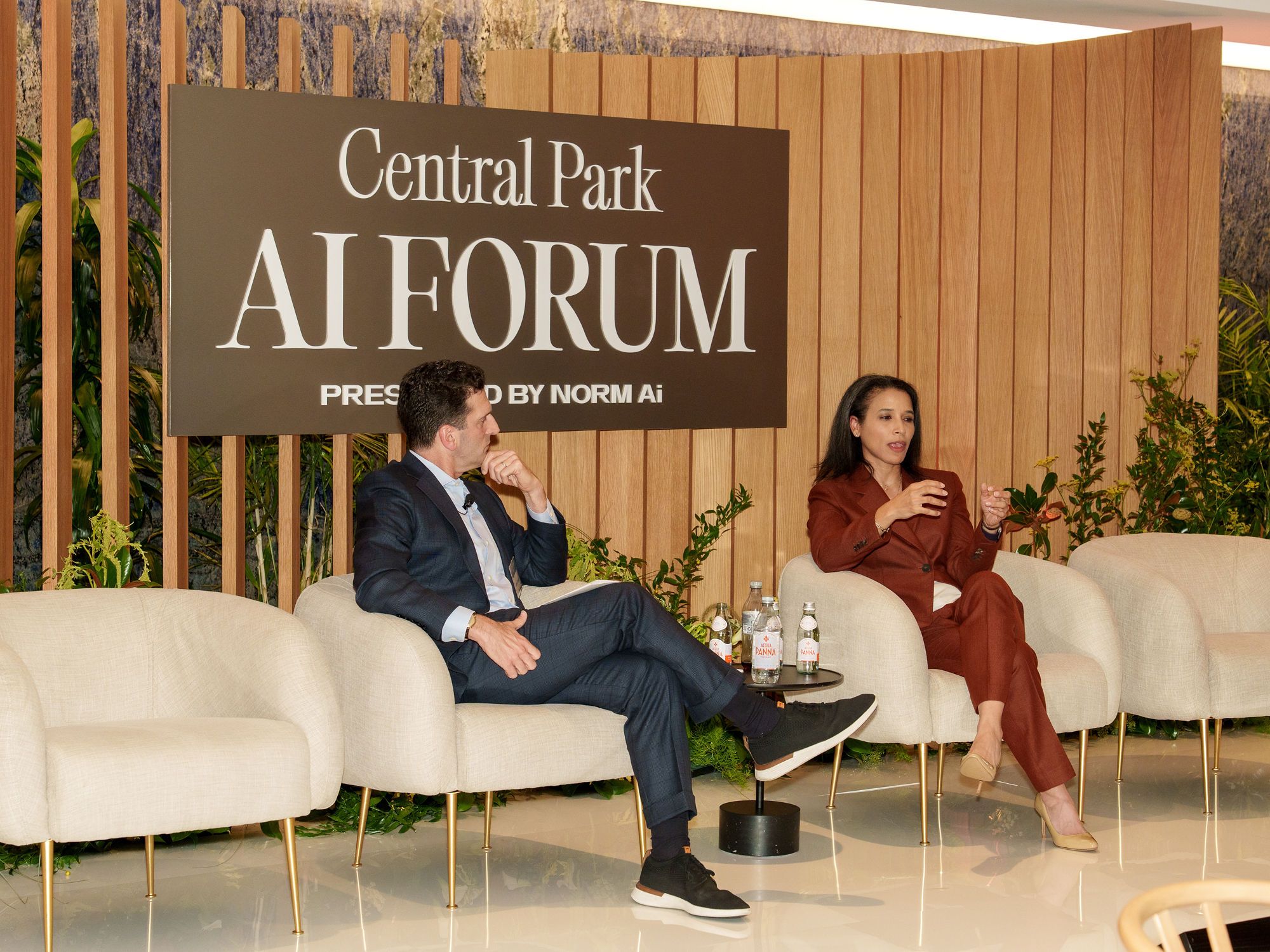Five Themes from the Central Park AI Forum
We are blessed to live in interesting times. Nowhere is this truer than when considering the impact of AI on society, law, and policy.
That is why Norm Ai convened the Central Park AI Forum, an invitation-only gathering of executives, law-makers, and regulators shaping the AI landscape.
Over the course of the day, over 100 invited leaders from some of the world’s largest enterprises including Morgan Stanley, Goldman Sachs, Blackstone, Meta, Amazon, Salesforce and OpenAI, and government leaders including White House officials, sitting and former U.S. Senators, and federal and state regulators gathered to explore the societal, legal, and economic implications of advanced AI.
What emerged was a series of insights covering a broad range of geopolitical, philosophical, technical and policy topics. For this post, we’ve organized them into five themes and removed confidential information so that they can be shared publicly as a way of furthering this critical discourse.

Theme 1 - This Could Be The Last Industrial Revolution
AI is reshaping our society, to say nothing of corporate functions like legal and compliance. Speakers pointed to the impact that AI is driving as the start of a new productivity boom, similar to the IT and internet driven growth of the 1990s. This time, however, there is the potential for even more pronounced growth as the primary driver shifts from improved information retrieval to abundant synthetic intelligence.
It was noted that AI could unlock productivity and economic gains so significant they are best described as a “discontinuity” in the rate of growth, a sea change that would once go far beyond disrupting industries to reshaping society itself.
Throughout the day, speakers shared in the sentiment that it is largely the responsibility of governments to adopt policies that will allow them to compete effectively at times of great change. Argentina was highlighted as an example of a state that failed to capitalize on clear structural advantages and realize their growth potential. Historical anecdotes further illustrated the epoch-defining impact of AI and the need to reflect carefully on the fact that we are on the precipice of a new age.
For a real-time perspective on the impact of AI technology in the economy, Casey Mulligan, Chief Counsel for Advocacy at the Small Business Administration, unveiled never before shared empirical data collected and analyzed by the federal government showing that small businesses are moving quickly to adopt AI (see figure below).
AI can scale specialized functions – like marketing (which was the most adopted use case) – in unprecedented ways, giving small firms the ability to leverage AI as a growth vector overnight.
Salesforce President & Chief Legal Officer, Sabastian Niles, and Amazon Chief Global Affairs & Legal Officer, David Zapolsky, shared insights from their businesses showing similar trends in AI adoption among smaller businesses.

Multiple speakers shared frontline perspectives from their firms, describing how they are using AI to augment and automate manual processes that have until recently only been accessible to human workers, including compliance checks.
Meta Chief Compliance Officer Henry Moniz highlighted how AI is accelerating workflows into real-time operations while a global investment bank shared how they are using Norm Ai to reduce compliance review cycles from weeks to minutes. Blackstone CTO John Stecher drove the point home, stating that trust must be engineered into AI systems with human-augmented workflows that embed firm context and accountability.
Theme 2 - America (and its Allies) Must Win The AI Race
Throughout the day, speakers warned that AI development and deployment is a strategic race with geopolitical ramifications, and that time is of the essence.
A U.S. Senator underscored the stakes: China is adding AI capacity at record pace and the U.S. and its allies will squander its leadership if it fails to stay ahead. This is a highly undesirable outcome, and the discussion on many panels turned to ways that the U.S. can maintain its advantage.
Senior White House Policy Advisor on AI, Sriram Krishnan, described the White House’s three-pillar AI Action Plan, of which he was a key author. The Plan focuses on AI innovation, American AI infrastructure, and international AI diplomacy and security. Mr. Krishnan then went on to describe a simple yet powerful way to interpret the success of American AI policies: by measuring the global market share of (large language model) token inference running on U.S. chips, models, and software.
In a look at how AI might be used to advance one of America’s greatest strategic assets, its capital markets, the SEC’s first Chief AI Officer, Valerie Szczepanik, outlined her vision for advancing AI innovation. Ms. Szczepanik covered enterprise architecture, data integration, and employee productivity.
Building on Sam Altman’s public remarks at the US Senate Hearing where he said “the cost of intelligence, the cost of AI, will converge to the cost of energy,” Open AI’s Chief Global Affairs Officer, Chris Lehane, likened infrastructure to destiny, highlighting Open AI’s Project Stargate, which intends to invest $500 billion over the next four years building new AI infrastructure.
Powering The AI Race is energy, and speakers emphasized the need for aggressive investment in domestic energy policy, infrastructure, and production. Business and government leaders alike pointed to permitting reform, nuclear investment, and grid upgrades as critical levers for unlocking the long-term capacity required to maintain a strategic advantage.
Theme 3 - Wisdom, Not IQ: Interdisciplinary Work Will Define the Future
Simply adding AI on top of legacy workflows will not drive meaningful change. Two concepts were shared which underscore the interdisciplinary nature of the AI enabled workplace and workforce.
First, was the idea that in the future, easy access to raw reasoning power and fact retrieval as a service will result in wisdom, commonly understood as an empathetic, context-informed and nuanced conception of facts, rather than IQ, becoming the true measure of intelligence for leaders.
Second, was the idea that humans will need to work together and cross-functionally to truly extract maximum benefit from AI. To this effect, one session suggested colleges double down on making teamwork a core part of their undergraduate curricula.
Using AI in Legal & Compliance workflows as a motivating example, speakers went on to discuss how interdisciplinary teams and new modes of thinking will be required to adequately capture the opportunities presented by AI in business settings.
For example, Dan Berkovitz, Former CFTC Commissioner and Former General Counsel of the SEC, highlighted the need for active interfacing and exchange between the public and private sectors to ensure knowledge sharing among regulators, lawyers, technologists, and business leaders. Meta’s Chief Compliance Officer, Henry Moniz, stressed the same theme into the corporate context, stating successful AI deployment requires integrated teams: engineers to build, lawyers to provide judgment, and compliance teams to operationalize.

Beyond legal and compliance, the Mayor of Hartford Connecticut, Arunan Arulampalam, highlighted the interdisciplinary work between private and public sectors as part of the Connecticut AI Alliance and Hartford’s AI Sandbox, both public-private partnerships bringing together industry, academic, and government participants to advance AI through education and upskilling.
In the private sector, Blackstone CTO John Stecher, and Goldman Sachs Chief Transformation Officer Bryon Lake discussed how pairing domain specialists with AI systems can multiply productivity and output within domains like finance, compliance, accounting, and sales, while reducing errors and cycle times.
And finally, Norm Ai Founder & CEO John Nay connected this directly to Norm’s concept of Legal Engineering, an interdisciplinary approach combining legal and AI techniques to encode rules and regulations in specialized AI systems focused on standards-based reasoning tasks.
Theme 4 - Government Enablement & Industry Execution: Legal Frameworks in the Age of AI
Speakers, including law-makers and regulators, discussed the need for a regulatory framework that promotes speed while managing risk and fueling economic growth at the federal, state, and local levels.
Senator Phil Gramm and Former White House Regulatory Czar Susan Dudley argued that the purpose of regulation is to prevent consumer harm, not to punish firms for scale.
Drawing on historical parallels to the Industrial Revolution, where excessive regulation could have slowed economic growth, they advised against rushing to draft narrow, tool-specific rules that would quickly become obsolete, and rather focus on broad, tech-neutral guidelines that target concrete risks such as bias or fraud, while leaving room for innovation.
White House Senior AI Advisor Sriram Krishnan cautioned against a fragmented state-by-state approach, and argued for using existing authorities and harmonizing rules.
Similarly, New York State Department of Financial Services Superintendent, Adrienne Harris, outlined her vision for a tech‑neutral framework grounded in principles like non-discrimination, paired with actionable requirements for model testing, governance, human oversight, and accountability.
Across sessions, speakers emphasized (1) the use, and applicability, of existing statutes to an AI-native world, and (2) the benefits of a principles-based approach to AI regulation.

Theme 5 - Legal & Compliance Advice Can Be Abundant
Forum participants suggested that AI is on the brink of ushering in a “golden era” for legal & compliance. Broadly speaking, this was defined as the point at which abundant legal & compliance advice causes legal & compliance functions to evolve from cost centers to revenue drivers, a vision that is increasingly within reach and one that we have pioneered at Norm Ai.
AI-enabled legal and compliance workflows offer the potential for significant productivity benefits, from reducing costs, accelerating decisions, and minimizing friction, for employees in regulated environments. However to realize these benefits, organizations will need to to fundamentally redesign individual workflows around AI-native operations.
In this new paradigm, repetitive, low-value “sludge” will be automated, freeing legal & compliance teams to conduct more thorough and comprehensive reviews in a fraction of the time. To further the point, a technology leader at a global financial institution shared how domain-specific AI systems built by Norm Ai are helping a large compliance team handle tens of thousands of complex compliance determinations per year, providing a glimpse at what a future with abundant legal & compliance advice might look like.
In a discussion centered around the growing tension between efficiency-oriented in-house teams and billable-hour oriented law firms, Norm Ai Founder & CEO John Nay and Meta Chief Compliance Officer Henry Moniz discussed the potential mismatch of incentives and the need to rethink the billable hour.
In Closing
We are blessed to live in extraordinary times, defined by constant change. The world we live in today is vastly different from that of 2020. And the world we’ll live in in five years will look very different.
What it looks like exactly will depend on many of the themes discussed during the Central Park AI Forum: the emergence of transformative technologies, the preservation of American AI leadership, the necessity of interdisciplinary ways of working, the fueling of economic growth by principles-based regulation, and the possibility of a world where legal & compliance advice is abundant.
Norm Ai is honored to convene the business and government leaders who drive these themes forward. We look forward to continuing the conversation at the 2026 Central Park AI Forum.
Register your interest to attend next year’s Forum and explore this year's agenda and speaker biographies here. You can also download the 2025 Central Park AI Forum Anthology, featuring recent AI policy articles shared with all participants here.
Lastly, be sure to watch our 2025 Central Park AI Forum recap video.
See Legal & Compliance AI in action
We’ll reach out to schedule a personalized demo.
Central Park AI Forum
Download the Central Park AI Forum pre-read anthology today.